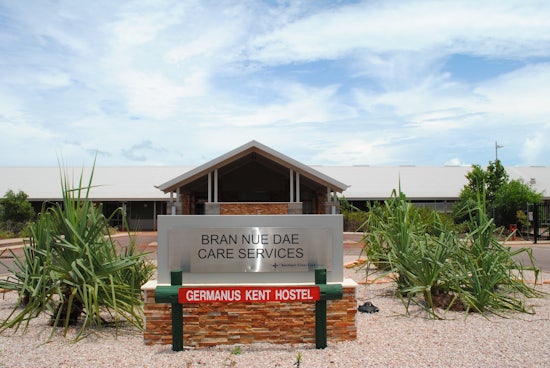Giving indigenous Australians a voice in aged care
A program which shines light on indigenous Australians, who are often described as “invisible” in the aged care industry, is in the running to win the prestigious 2015 Aged & Community Services Western Australia (ACSWA) Excellence in Care Awards.

The entrance of Southern Cross Care's (WA) Germanus Kent House where the program, Pastoral Care in an Indigenous Context, Gailya Mabudyan (Life is Good!), is offered.
The program, titled 'Pastoral Care in an Indigenous Context, Gailya Mabudyan (Life is Good!)', is offered at Southern Cross Care (SCC) (WA) aged care home, Germanus Kent House and has been nominated as a finalist in the category of 'Projects – Innovation and Best Practice Award 2015'.
Germanus Kent House facility manager, Andrew McGaw, says the initiative “shines the light on a client group that is often invisible within the aged care industry”.
“It is a small demographic group and one with high needs physically, emotionally and spiritually. It is to SSC's credit that it underwrites the significant costs of delivering high quality care in tune with local heritage values and beliefs in such a remote location,” Mr McGaw says.
Germanus Kent House is located in Broome in Western Australia's remote Kimberley district. Most of the clients are aboriginal with more than 50% having lived on remote aboriginal communities prior to entering the service.
Life in an aboriginal community is very different to life in a mainstream Australian town or city. Colonisation of the Kimberley occurred more recently than in other parts of Australia.
Some residents were part of family groups that had “first contact” with Western society in the late 1960s.
Clients from remote communities are strongly embedded in their “country” (buru) of origin. Their food experience revolves around bush meat and seasonal fruits. Families of origin are extremely large and kinship networks utterly different to Australians of Asian, European or African descent.
“Meeting the pastoral needs of aboriginal community members is very challenging because of the complexity of differences between the communities themselves; residents are broadly defined as saltwater, freshwater or desert folk,” Mr McGaw says.
“There are five broad language groups across the region each of which historically had up to a dozen dialects. The totemic relationships of community members to relatives, flora and fauna still persist in the form of skin relationships.
“Because of this complexity it is not always possible for Germanus Kent House to meet each individual's specific needs and an approach has been developed to meet the pastoral needs of residents within the structures of the facility environment, aged care funding and the regulatory environment.”
According to Mr McGaw, if the project is successful in winning an award, it will send a strong signal that activities of an organisation that offers aged care services on a truly mission basis are worth embarking upon.
It also provides further credibility to the strength of the programs we are creating and delivering in the region, he adds.
The ACSWA Excellence in Care Awards 2015 celebrate excellence across the not for profit aged and community care sector in Western Australia and recognise the people who contribute to maintaining the quality of life of older people, people with disabilities and their carers.






















